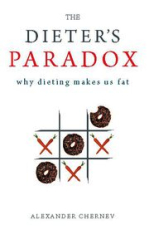 The Dieter's Paradox: Why Dieting Makes Us Fat
The Dieter's Paradox: Why Dieting Makes Us Fat
Cerebellum Press, August 2011
Why despite the increased popularity of weight-loss programs and
the greater availability of healthy options, are Americans getting
heavier? Does dieting make us fat?
In The Dieter's Paradox, Northwestern University psychologist Alexander Chernev describes decision fallacies that make us gain rather than lose weight. Bringing to life the latest research in psychology, decision sciences, and behavioral economics, Chernev cleverly reveals the irrational ways we think about eating and dieting and identifies seven decision traps we frequently fall into in our zeal to be fit.
Paperback | ISBN: 9781936572106 | Publication Date: August 2011
Reviews:
"The Dieter's Paradox shows us why our most noble attempts
to lose weight often fall prey to classic human biases. Alex
Chernev takes a potfull of interesting experiments and boils them
down to create a dieter's consomme, an elegant but easily
digestible collection of resrarch in behavioral sciences that
illuminates our irrational eating decisions."
-- Dan Ariely, author of Predictably Irrational and
The Upside of Irrationality
"Want to turn around your mindless eating? One place to start is
with The Dieter's Paradox. It shows that our best
intentions can trip us up and teaches us how to rewire our
thinking to avoid decision traps such as health halos and the
no-choice fallacy"
-- Brian Wansink, author of Mindless Eating: Why We Eat
More Than We Think
"With this book Alex Chernev has provided something of immense
value. He's shown us how to manage something we all care about by
giving us great information hardly any of us knew about"
-- Robert Cialdini, author of Influence: Science and
Practice
"Alex Chernev has discovered that many people believe they can
cut a meal's calorie count by an ingenious method -- adding more
food!"
-- Scientific American
"The Dieter's Paradox is a must-read for anyone who has
tried to manage their weight and does not understand why they
failed, and for anyone who has succeeded and wants to know what
they're doing right"
-- Psychology Today





